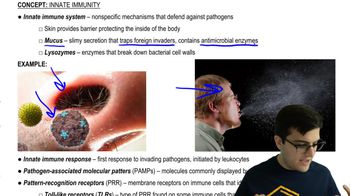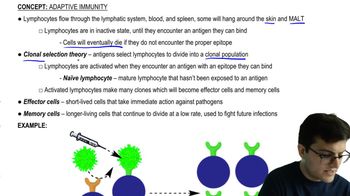What is one of the differences between CD4+ and CD8+ T cells? a. CD4+ cells are immature, and CD8+ cells are mature. b. CD4+ cells are activated, and CD8+ cells are not. c. CD4+ cells interact with class II MHC proteins, and CD8+ cells interact with class I MHC proteins. d. CD4+ cells activate cell-mediated responses, and CD8+ cells activate humoral responses.
Why is clonal selection necessary for the adaptive immune response but not the innate immune response? Select True or False for each statement. T/F The adaptive immune response uses receptors to recognize pathogens, and the innate immune response does not. T/F There is more receptor diversity in the adaptive immune response than in the innate immune response. T/F Cells in the innate immune response do not require activation, and those in the adaptive immune response do. T/F Clonal selection is used for targeting pathogens, and the innate immune response is used only to stop blood flow from the wound.
 Verified step by step guidance
Verified step by step guidance
Verified Solution
Key Concepts
Adaptive vs. Innate Immune Response

Clonal Selection

Receptor Diversity

Explain how gene recombination leads to the production of vast numbers of different B-cell receptors.
What steps are required for most B cells to become fully activated and differentiate into plasma cells?
What would a vaccine have to contain to protect a patient from chicken pox? Explain why we don't have vaccines for HIV.
Which of the following outcomes would be expected if somatic hypermutation did not occur? a. The diversity of pattern-recognition receptors would be significantly lowered. b. B and T lymphocytes would not be able to produce receptors that recognize antigens. c. The adaptive immune response would not be activated by pathogens. d. The secondary immune response to a repeat infection would produce the same antibodies as those made in the primary immune response.
Propose a hypothesis to explain how self-reactive B cells are identified and eliminated during maturation.
